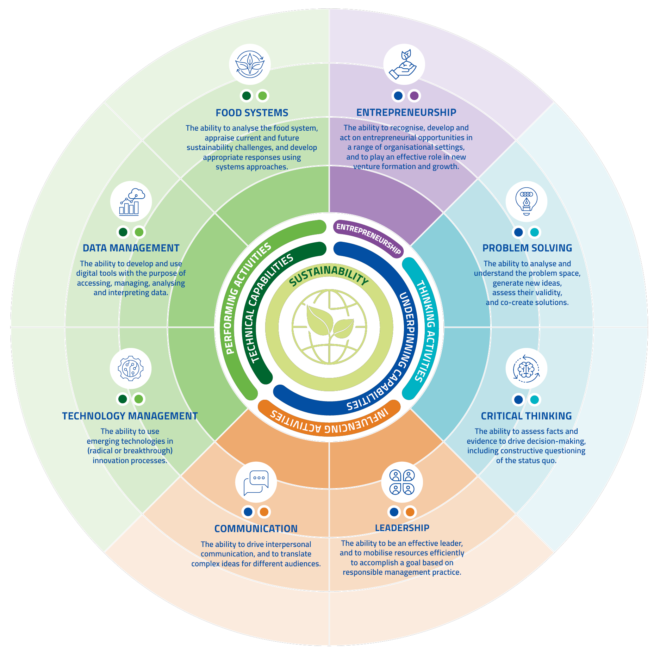EIT Food at the forefront of the agri-food transformation
The agri-food ecosystem is one of the 14 key industrial ecosystems identified in the EU's Industrial Strategy. This strategy announced the co-creation of transition pathways with stakeholders to help accelerate the green and digital transition.
This document reflects the results of a co-creation process with stakeholders active in the ecosystem. The recommended actions do not necessarily represent the position or endorsement of all stakeholder groups nor the position of individual Member States or the European Commission. This document is without prejudice to any future initiatives. The actions presented in this document describe ambitions and desired objectives for the transition.
Source : Transition pathway for the agri-food industrial ecosystem - published on 11 March 2024, by the European Commission, Directorate-General for Internal Market, Industry, Entrepreneurship and SME's + Editor's Notes

Background on the co-creation process of this document
Source : Transition pathway for the agri-food industrial ecosystem - European Commission (europa.eu)
This collaborative effort aims to build on existing strategies and enable their implementation by providing concrete actions. These actions aim to reinforce commitments by relevant actors towards the sustainability, digitalisation and resilience of the ecosystem.
The Commission invited all relevant stakeholders from the public and private sector to collaborate on developing this transition pathway. Along with participants from other sectors, contributions were made by companies, industry groups and governmental bodies, as well as social partners, research institutes, academia and citizens.
This comprehensive and inclusive approach allowed the Commission to pinpoint the challenges and opportunities of the transition. It also helped with drafting specific actions and commitments.
The public consultation resulted in 80 responses from many different stakeholders, such as business associations, non-governmental organisations, public authorities, trade union organisations and citizens.
Below some highlights from the original document.

What are the presented actions, ambitions and desired objectives for the transition ?
The transition pathway for the agri-food ecosystem covers eight main areas of intervention.
Chapter 4 sets up the main actions under these building blocks of the EU Industrial Forum Blueprint:
- Sustainable competitiveness
- Public governance
- Social dimension
- Research and innovation (R&I) and technological solutions
- The single market and infrastructure
- Skills
- Investments and funding
Skills
In the framework of the European Skills Agenda the European Commission is addressing the skills needs of the industrial ecosystems, including the agri-food ecosystem. The Commission has organised multiple high level round tables for the ecosystems, for example, with the roundtable to discuss skills in the agri-food ecosystem taking place in February 2021. Discussions during this roundtable showed that a skilled workforce is crucial to ensure a successful transition, support the competitiveness of the European economy and the quality of job creation in the agri-food sector.
The Role of EIT Food in the EcoSystem
EIT Food, which is also a member of the partnership, has developed and launched learning services for employers. These services are meant to provide support in recruitment, retention and career progression of innovation-active staff in the sector.
What are the Skills, identified by the EC, needed for the agri-food transformation ?
- Digital skills
- Sustainability skills
- Soft skills
- Food system approach related skills
- Efficient use of resources and logistics skills
- Highly skilled professions
- Innovative solutions skills
- Risk management skills
- Financial and economic skills
- Legislation and regulation skills
- Food safety management skills
- Food quality management skills
- Food packaging skills
- Bioeconomy related skills
- Administrative skills
- Impact management skills
- Crisis management
What are the 8 Key Skills - Core Competencies, that EIT Food Education is focusing on ?
Technical Capabilities
- Food Systems (covering the Skills identified by the EC : Food Safety, Food Quality, Food Packaging)
- Data Management
Technology Management
Underpinning Capabilities
- Communication
- Leadership
- Critical Thinking
- Problem Solving
Entrepreneurship
Sustainability is at the core of all competencies, and so also at EIT Food's Competency Framework. Our competencies are oriented around three key elements/ three Missions that guide the framework to contribute to food system transformation:
- Promoting healthier lives through food.
- Striving for a net-zero food system that prevents biodiversity loss.
- Fostering a fully transparent, fair, inclusive, and resilient food supply.

EIT Food Education - your Trustworthy Partner in the agri-food sector for upskilling and reskilling your workforce
Based on our extensive experience in food industry and innovation, we have defined 8 specific competencies needed to transform the food system.
The EIT Food Competency Framework identifies the key competencies and capabilities required for innovators and entrepreneurs to possess to drive effective change in the food system. Each of these consisting out of four competency levels. Ranging from exploring the foundations of the skill, to possessing the ability to positively transform the food system as we know it.
Combining these competences and levels makes it possible for professionals to advance their careers in the agri-food sector and to guarantee the quality of their education.
This Competency Framework is already fully aligned with the priorities and skills identified by the European Commission. And demonstrates that EIT Food Education is the Trustworthy Partner, for employers for upskilling & reskilling your workforce.
How is EIT Food Education contributing to the agri-food transformation ?
Examples of EIT Food Education Collaboration on EU Projects and other projects
As a key player in the training and up- & reskilling framework

“Over 40 million people are currently employed within our European food system, from production and manufacturing through to retail and hospitality. However, speaking to over one thousand employers across Europe revealed that most do not feel adequately prepared to deal with the challenges facing our food system. As the first pan-European initiative of its kind, we hope to see our Learning Services set a standard of excellence for professional development in the agri-food industry and support employers to upskill their workforces to deal with the challenges that lie ahead. ”